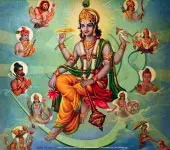Bhagavan's External Deeds
Transcript
(Click here to read more)
Bhagavan is Antaryami. What does that mean? He controls everyone and everything from within. Just as he is omnipresent, he is everywhere; he is inside also. So he should be inside Kamsa. So why didn't Bhagavan destroy Kamsa and his associates from within itself? Why did he have to kill them physically, externally? The world operates in certain ways. Bhagavan has only set the ways in which the world operates. It is his system. Why would he violate his own system? In the world, there are rules. Ta....
Transcript
(Click here)
Bhagavan is Antaryami.
What does that mean?
He controls everyone and everything from within.
Just as he is omnipresent, he is everywhere; he is inside also.
So he should be inside Kamsa.
So why didn't Bhagavan destroy Kamsa and his associates from within itself?
Why did he have to kill them physically, externally?
The world operates in certain ways.
Bhagavan has only set the ways in which the world operates.
It is his system.
Why would he violate his own system?
In the world, there are rules.
Take a can of petrol, pour it over something, and set fire with a matchstick.
It will burn down.
The fire, power to burn is in petrol, it is inside petrol.
But merely by pouring petrol over something, it doesn't burn.
The stimulus has to come in the form of a burning matchstick.
Then only the power of petrol to burn is released.
In the same way, even if Bhagavan is inside Kamsa, he would wait to be triggered by his own Krishnavatara which is external, external to Kamsa.
Because it is not just destroying evil, there is so much more involved.
The whole episode is a teaching to the whole world.
So much to learn - what is evil, evil will not survive for long, power of Bhagavan, role of Bhagavan - so much to learn.
This learning can happen only when it is visible, perceivable to everyone.
Bhagavan does everything visibly so that everyone can learn from it.
Recommended for you
Simple ways to progress spiritually
 Click here to know more..
Click here to know more..
Durga Saptashati - Chapter 13

om ri'shiruvaacha . etatte kathitam bhoopa deveemaahaatmyamuttamam . evam prabhaavaa saa devee yayedam dhaaryate jagat . vidyaa tathaiva kriyate bh....
Click here to know more..Ganapati Mangala Ashtakam

gajaananaaya gaangeyasahajaaya sadaatmane. gaureepriyatanoojaaya ganeshaayaastu mangalam. naagayajnyopaveetaaya natavighnavinaashine. nandyaadigananaa....
Click here to know more..
English Topics
Bhagavatam
Click on any topic to open
- 65 Bhagavan's External Deeds
- 64 Is the Body Yours?
- 63 What's So Great About The Stories Of Sri Krishna
- 62 What To Do If You Just Don't Have Interest In Bhagawan
- 61 Which God Should I Worship?
- 60 How To Observe Dharma Properly
- 59 Devotee's progress
- 58 Which Guruji Can You Trust
- 57 Bhagawan Is Beyond Human Comprehension
- 56 The Missing Piece: Why Your Spiritual Practices Are Not Working
Please wait while the audio list loads..
30
Ganapathy
Shiva
Hanuman
Devi
Vishnu Sahasranama
Mahabharatam
Practical Wisdom
Yoga Vasishta
Vedas
Rituals
Rare Topics
Devi Mahatmyam
Glory of Venkatesha
Shani Mahatmya
Story of Sri Yantra
Rudram Explained
Atharva Sheersha
Sri Suktam
Kathopanishad
Ramayana
Mystique
Mantra Shastra
Bharat Matha
Bhagavatam
Astrology
Temples
Spiritual books
Purana Stories
Festivals
Sages and Saints
